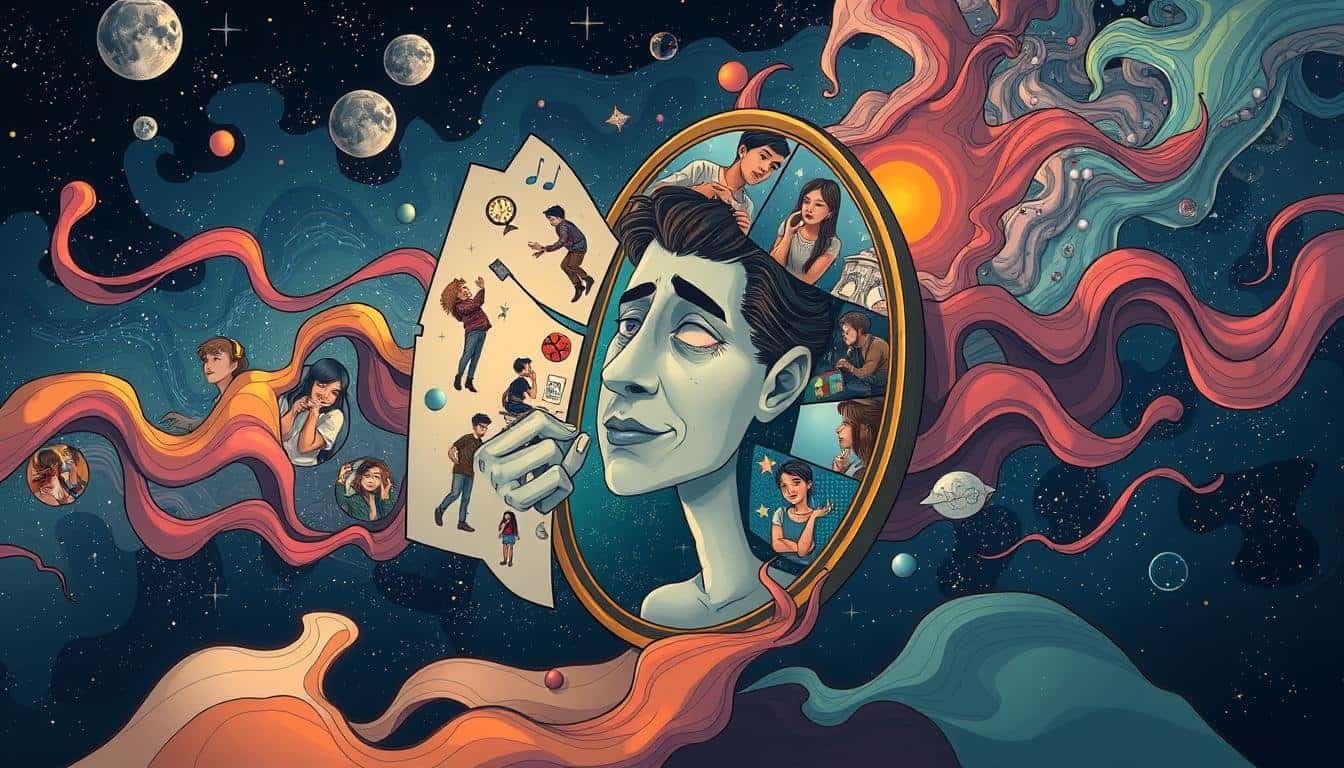Philosophy of Identity: What Makes You, You?
What if everything you thought you knew about yourself was wrong? The philosophy of identity explores deep questions about who we are and why. It asks: What makes you, you? This question looks at things like your personality, life experiences, and memories. These things help shape what makes you unique.
Thinkers like Michael Allen Fox suggest that old ideas about personal identity might not work today. This has led to a new interest in what really shapes our identities. The debate between physical and psychological continuity challenges how we see ourselves. It makes us think differently about who we are over time.
This journey into identity looks at both old and new ideas. It shows how complex and deep our identities are.
Let’s dive into the many theories and ideas that have shaped our understanding of identity over time.
Key Takeaways
- The philosophy of identity challenges traditional notions of self.
- Physical and psychological continuity theories represent two divergent views on personal identity.
- Identity is often shaped by memories and personal experiences.
- The Ship of Theseus thought experiment questions the concept of physical identity.
- Existential philosophy emphasizes actions and behaviors over static attributes.
- Memory plays a critical role in how we define personal identity.
Understanding Personal Identity
Exploring what makes us who we are is key to understanding personal identity. This topic is complex, bringing up questions like what defines a person and when we start being one. Philosophers have debated how we stay the same over time and what proves our sense of self.
Our personal identity changes across different situations and people. Things like our memories and how we look help shape who we think we are. Sometimes, we might feel lost, questioning our sense of self, known as an identity crisis.
John Locke, a famous philosopher, has greatly influenced our view of personal identity. In his 1694 book, An Essay Concerning Human Understanding, he shared important ideas. Locke believed our identity comes from being aware of ourselves over time and space. This idea links closely with understanding ourselves.
Philosophers also debate the population question of personal identity. They wonder if more than one person can exist in one body. These debates make us think differently about being an individual and how we see ourselves and others.
Exploring the Concept of Self-Concept
Understanding oneself is key to the self-concept. It’s made up of beliefs, attributes, and how we see ourselves. People see themselves in many ways, like through family, religion, and work. These shape their unique identity based on their life and the people they meet.
Self-concept has many sides, touched by things like gender, race, and social class. These labels shape how we see ourselves and what others expect from us. Changing these labels can open up new ways to see ourselves and our place in the world.
Carl Rogers, a psychologist, says self-concept includes our ideal self, how we see ourselves, and how we value ourselves. When these don’t match, it can hurt our self-esteem. Growing and understanding ourselves is key to improving our self-concept, helped by love and support.
The Multidimensional Self-Concept Scale by Bruce A. Bracken looks at self-concept in many areas, like school and social life. When teachers believe in students, it boosts their self-concept. This shows how others can affect how we see ourselves.
Culture, media, and our social circles shape our self-concept. As we move through life, we work to keep and improve our self-image. This process helps us become more aware of who we are and can make our identity clearer.
Philosophy of Identity: What Makes You, You?
Philosophers have long explored what makes us who we are. They look at historical views and theories to find answers. These ideas help us understand how we see ourselves and our place in the world.
Theories of Identity
Many theories shape how we think about identity today. The Body Theory says our bodies are key to who we are. On the other hand, the Brain Theory believes our thoughts and consciousness define us.
John Locke’s Data Theory adds that our memories and traits shape our identity. These theories help us think about tough cases like brain transplants. They show how we often stick with our memories and traits, even if our bodies change.
Historical Perspectives
Looking back, ancient Greeks first pondered the nature of self. Modern thinkers like Locke have also shaped our views on identity. Philosophers have proposed many ideas, from souls to psychological continuity.
These ideas help us see how our understanding of identity has changed. They also show the different ways philosophers view identity. Thought experiments like the Teletransporter bring these debates into the future, making us think about identity in a world with new technologies.
Characterization of Personal Identity
The characterization of personal identity is about knowing what makes each person unique. It looks at things like experiences, beliefs, and groups we belong to. These things help shape who we are.
John Locke believed that knowing ourselves comes from recognizing ourselves at different times and places. He thought memory was key to keeping our identity steady.
Philosophers like Derek Parfit have questioned the old ideas about what makes us who we are. They ask if being the same person depends on our biology and thoughts. This leads to deep talks about how memory and awareness shape our identity. It also makes us think about people who change a lot because of mental health issues or amnesia after being in a coma.
Old psychology views identity as fixed, but this might not capture how our identities change over time. Our personalities can change based on our surroundings, leading to big shifts in who we are. For example, a person who focuses too much on work might lose touch with their family and their true self.
Keeping a steady story of ourselves is important when life changes. This helps us stay stable through ups and downs. The characterization of personal identity shows that our identities can change but still stay connected to our core selves. Understanding this helps us grasp the complex nature of our identities.
Body Theory and Its Implications
The Body Theory says that our bodies shape who we are. It links our identity closely to our physical form. This idea makes us think about how we see ourselves over time.
Many thinkers today explore this link between body and identity. They show how complex and deep this relationship is.
Physicality and Identity
This theory suggests that keeping the same body is key to staying the same person. It uses the example of a watch to ask big questions. If you take apart and put back together, is it still the same watch?
This question leads to deeper thoughts on how changing our bodies affects who we are. For example, getting an organ transplant or changing our looks. Christian beliefs on the resurrection of the body also support this idea. They say our body is crucial to our identity.
Challenges to Body Theory
Even though it makes sense, the Body Theory faces challenges. Changes in our lives and bodies make it hard to keep seeing ourselves as the same. The idea that our brain, not our body, might define us is another challenge.
Philosopher Peter van Inwagen asks if rebuilding something is the same as keeping it original. Others say memories alone don’t keep our identity intact. This shows a big debate in philosophy. Some believe identity is all about the body, while others think it’s about the mind or soul.
| Perspective | Description | Challenges |
|---|---|---|
| Body View | Identity is identical to the physical body. | Transformation and identity continuity issues. |
| Brain View | Identifies a person with their brain’s functions. | Distinction between thought and neural activity. |
| Memory Continuity View | Identity is tied to memories. | Apparent remembering does not assure actual events. |
| Character Continuity View | Focuses on consistent character traits. | Character alteration affects identity perception. |
Looking into the Body Theory shows us how our bodies and identities are connected. It also shows the challenges we face as we change. These discussions help us understand what makes us who we are and encourage us to think more deeply about it.
How the Brain Influences Personal Identity
The link between the brain and personal identity is intriguing. Philosophers and neuroscientists study how brain functions, memory, and thought shape who we are. Changes in the brain can change how we see ourselves.
The identity theory of mind started in the 1950s with U.T. Place and Herbert Feigl. They said our thoughts and feelings come from the brain’s physical states. This idea fits with a materialistic view, linking our mental life closely to brain activity.
This theory suggests that sensations are brain processes. But the relationship is complex, not just a simple link. Identity theorists believe these connections are not set in stone. They highlight the gap between what we feel and the brain’s workings.
Personal identity challenges the idea of a fixed, unchanged self. Derek Parfit argued that our identity depends more on continuity than a single ego. Questions come up in scenarios like teletransportation, where someone is copied atom by atom, asking what makes us who we are.
False memories also play a role in identity. People can have memories that aren’t really their own. This shows personal identity isn’t just about our experiences. It makes us rethink what makes us who we are.
Looking into identity, we see it’s not just about a single ‘self.’ It’s about complex connections within our experiences. Seeing identity through the brain’s lens helps us understand ourselves better.
Psychological-Continuity Views of Identity
Understanding personal identity through psychological continuity offers a deep look at the mind and memory. It shows how our sense of self changes or stays the same over time. This view gives us a detailed picture of what makes us who we are.
Memory and Identity
Memory is key in understanding identity from a psychological point of view. John Locke believed that our consciousness, not our brain, is the core of who we are. He thought that our identity stays the same if our memories do, even if our body changes.
Locke’s idea is that we can change but still be the same person if we keep our important memories. Critics like Joseph Butler and Thomas Reid questioned this idea, saying it’s not strong enough. But memory is still seen as vital in seeing how our identities change.
Impact of Psychological Changes
Psychological changes, like trauma or big life events, show that our identity isn’t fixed. These changes can deeply change how we see ourselves and our life stories. Locke believed that our consciousness and memories keep our identity safe. But changes in our mental state can make us see ourselves in new ways.
This shows how our sense of self changes with our experiences and thoughts. It points out that our identity is shaped by our interactions with the world around us.
The Data Theory: Who Are You Really?
The Data Theory says our identity comes from our mental data, like memories and personality. It sees personal data as the core of who we are. This idea makes us think deeply about ourselves and how we connect with others.
Imagine swapping memories from one person to another. This idea makes us rethink what makes us who we are. It shows how important our mental states are in shaping our identity.
Identity issues touch on many areas, like:
- Philosophy of mind
- Metaphysics
- Epistemology
- Ethics
- Political theory
Historical thinkers like John Locke believed consciousness plays a big role in our identity. He thought it’s made up of our experiences and thoughts. Others say it’s our experiences that truly define us, not a single identity.
Here’s a table that shows the difference between physical and psychological views on identity:
| Approach | Definition | Focus |
|---|---|---|
| Physical | Identity based on physical characteristics and continuities | Brain, body, and physical attributes |
| Psychological | Identity rooted in mental states and perceptions | Memories, personality traits, and experiences |
| Sceptical | A questioning of identity as a coherent concept | Challenges the traditional views and relevance of identity inquiries |
The Data Theory makes us think deeply about what makes us who we are. It starts debates on how we see ourselves and others. This deep dive into personal data shapes our views on identity today.
Challenges to Personal Identity Theories
Exploring personal identity brings up big challenges for identity theories. Philosophers like John Locke have thought deeply about what makes us who we are. Locke said our memories help keep us the same person over time. But, Thomas Reid pointed out a problem with this idea, known as the ‘Paradox of the Brave Officer’. It asks if we’re still the same person if we remember our past but don’t feel connected to our old selves.
Some theories say our bodies are key to our identity. They believe staying the same physical person is important for who we are. Yet, these ideas are being challenged by new thoughts from psychologists. They say our identity is tied to our mental states and how they connect over time. Harold Noonan talked about how our actions, beliefs, and memories are all linked to our identity.
Derek Parfit added to the debate with his teleportation scenario. He showed how our identity changes over time, shaping our beliefs and traits. But, his idea of making copies of us raises questions about our unique identity.
David Hume also questioned the idea of a constant self. He believed our identities change too much to find fixed qualities that define us. Philosophers are still trying to figure out what makes us the same person over our lives.
These debates show how complex personal identity is. Philosophers argue about whether it’s our bodies or our minds that keep us the same. These discussions help us understand how our identity changes and what it means to be ourselves.
The Future of Identity Philosophy
The future of identity philosophy is changing fast, thanks to new tech and fresh ideas. We’re moving from old ideas of who we are to new ones shaped by the digital world. Now, things like digital identities and virtual worlds are making us rethink what makes us who we are.
Old theories like John Locke’s idea of a person as a “thinking intelligent being” don’t quite fit today. With new tech like brain transplants or changing memories, we see identity as more flexible. It’s not just about being one fixed thing; it’s about how we change over time.
Imagine a world where you could be moved to a new body or have your memories changed. This makes us think hard about what it means to be us. It shows that our identity can shift with each new moment.
As we look to the future, we’ll need to think more about how many people exist at once and what makes them who they are. This will push us to rethink our ideas about identity. We’ll need new ways to understand and talk about these complex questions.
| Concept | Description | Implications for Identity |
|---|---|---|
| Digital Identities | Representations of individuals in the online realm. | Blurs boundaries of authentic self and constructed self. |
| Artificial Intelligence | Machines exhibiting human-like intelligence. | Challenges notions of personhood and consciousness. |
| Memory Alteration | Manipulation of an individual’s memories. | Questions the permanence of identity over time. |
| Hypothetical Scenarios | Thought experiments addressing identity dilemmas. | Encourages innovative thinking in identity theory. |
Conclusion
Exploring personal identity makes us think deeply about what makes us who we are. Theories like Body Theory, Brain Theory, and Data Theory show how our self-concept is shaped. Questions like “What am I?”, “When did I begin?”, and “What occurs when I die?” help us grasp the essence of being us.
Looking into these theories and thought experiments, we see how diverse views shape our understanding. From Locke’s ideas to modern debates, the topic of identity keeps evolving. It reflects our personal stories and the changes in society.
Memory, continuity, and even questions about the soul add depth to our self-concept. The study of personal identity pushes us to look inward and discover ourselves. By understanding the complexity of our identities, we can live more thoughtfully. This journey improves our self-awareness and connects us more deeply with others in a changing world.
Source Links
- A New Look At Personal Identity | Issue 62
- Historical Introduction to Philosophy/Personal Identity – Wikiversity
- Microsoft Word – Lecture V.doc
- Personal Identity
- Locke on Personal Identity
- Exploring the Concept of Identity
- What Is Self-Concept and How Does It Form?
- What is Self-Concept Theory? A Psychologist Explains
- What Makes You You? — Wait But Why
- The Mystery of Personal Identity: What Makes You and Your Childhood Self the Same Person Despite a Lifetime of Change
- Personal Identity | Internet Encyclopedia of Philosophy
- Personality and Personal Identity
- Psychological Approaches to Personal Identity: Do Memories and Consciousness Make Us Who We Are?
- PHIL 176 – Lecture 11 – Personal Identity, Part II: The Body Theory and the Personality Theory
- What’s So Simple About Personal Identity? | Issue 107
- The Mind/Brain Identity Theory
- Personal Identity
- John Locke on Personal Identity
- Who am I? The Philosophy of Personal Identity
- 6.2 Self and Identity – Introduction to Philosophy | OpenStax
- Personal identity
- A Philosophical Identity Crisis | Issue 97
- Nerdfighteria Wiki – Arguments Against Personal Identity: Crash Course Philosophy #20
- Personal identity
- Personal Identity: How We Exist Over Time







